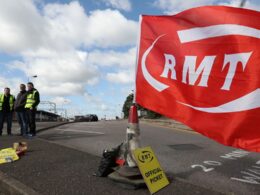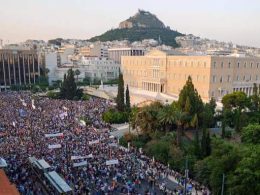Six MPs from the neo-fascist Golden Dawn are in prison, accused of leading a ‘criminal organisation’. Among them is its leader, Nikolaos Michaloliakos. Three other MPs have been released on bail. With nine of their total of 18 MPs (elected in June 2012) out of the way one would expect to see the decline of Golden Dawn. Yet it remains the third force, with 8-11% support in the polls – up to last September, before the murder of the left activist and rapper Pavlos Fyssas, it was on 13-15%.
If the capitalist state and judiciary do not ban Golden Dawn it is quite likely to participate as a ‘legitimate’ party in May’s municipal and euro-elections. One more piece in this ‘theatre of the absurd’ was the statement of Ilias Kasidiaris, Golden Dawn second-in-command, that it will appeal to the European Court to defend its democratic rights. (Nick Griffin of the British National Party stated that he will support this campaign.)
All this is happening in the country where the labour movement has organised 31 general strikes in the last three years against the savage austerity of the government and the troika (the EU, IMF and European Central Bank). And in the country where a government of the left is becoming more and more likely, as recent polls show, with Syriza (Coalition of the Radical Left) as a dominant power. This is a confirmation that Greek society has entered an era that combines revolutionary convulsions and great social upheavals, with the inevitable recoil of the forces of reaction and counter-revolution.
In September 2013 it was not another general strike but a political assassination that attracted the attention of workers and youth in Greece and internationally: that of left activist and rapper Pavlos Fyssas, at the hands of the fascists of Golden Dawn.
Then, in November, the murder of two Golden Dawn members by a new group, Fighting Revolutionary Popular Forces. When it claimed responsibility in a press statement, it described the action as a help to the anti-fascist movement. Instead, it has strengthened the forces of reaction. It allowed Golden Dawn to throw away the stigma of the abuser and to wear the halo of the victim, and to become visible again in the mass media.
This development temporarily caused some confusion in the mass consciousness. But it does not change the fact that the murder of Pavlos was a turning point for the developments in Greece with important lessons for the workers’ movement in Greece and internationally.
A green light to Golden Dawn
The murder was not unexpected. Murders of immigrants had been reported several times before but Golden Dawn always got away with it. Before the 2012 elections, attacks against the left were not a high priority for Golden Dawn members. That changed between the two elections, when Kasidiaris in a live TV programme attacked two left-wing women MPs, Liana Kanelli (KKE – Communist Party) and Rena Dourou (Syriza). This did not affect Golden Dawn’s electoral rise, and the party saw this as a green light. After the elections, attacks against the activists of different left forces have become very common.
Another reason that Golden Dawn felt emboldened was the inaction of the mass left parties which had never called for a united national mobilisation against fascist attacks – until the murder of Pavlos. Golden Dawn, drunk by its success and assisted by state funding, turned to expand its popular base. It separated its organisation into two parts: ‘political’ and ‘military’. The former was in charge of legal and public activities, the latter for the hidden and criminal ones. In a few months Golden Dawn opened offices in 70 cities and began organising food distribution, blood donations and social clinics ‘for Greeks only’!
It visited workplaces that employed immigrants and blackmailed employers to sack them and replace them with Greeks – brought in by Golden Dawn – on the same low pay (€15-18 a day). It campaigned for public kindergartens to kick out immigrants’ children and for public hospitals to refuse access to undocumented immigrants. All of this was presented as a help to the long-suffering Greeks! Under their suits and ties they remained unrepentant Nazis. A big part of their programme copies that of Adolf Hitler’s in the 1930s.
Golden Dawn organised armed squads which began to patrol and attack immigrants. In most of its public rallies, Michaloliakos was greeted with Nazi-style salutes. Several of its MPs have swastika tattoos and other Nazi symbols. Denying the Holocaust, admiring the 1930s Greek dictator Ioannis Metaxas and the Greek military junta (1967-74), and using the sayings of Hitler and Goebbels, have become very common in their public speeches. Research by lawyers and journalists constantly brings to the surface new evidence, such as uniforms of the SS or the Ku Klux Klan, weapons in their homes, and photos of Hitler.
The movement begins to respond
Instead of coming from the mass left parties, the response came from the anti-fascist movement. The shock of the election of 18 Golden Dawn MPs – and its meteoric rise from 0.3% (23,000 votes) in 2009 to 6.9 % (440,000 votes) in 2012 – acted as an alarm call for large parts of society. A new phenomenon emerged: the building of local anti-fascist committees.
Before the murder of Pavlos, 60 committees had emerged nationwide. More have been established since. The mass left parties played little or no role in this process, with the KKE not involved anywhere and Syriza participating in some but not all. In reality, most were initiated and built by forces such as Xekinima (the Greek section of the CWI), some of the component organisations of Syriza, and Antarsya (front of the anti-capitalist left), anti-racist organisations, unorganised people, etc.
These committees, the anti-fascist movement in general, and local communities started to organise dynamic resistance against Golden Dawn. In one case in Kyparissia, Messenia, self-organised migrant petty-traders chased Golden Dawn members from a local festival. In Chania, Crete, the local leader of Golden Dawn was thrown naked into the sea by anti-fascist demonstrators, and was then expelled from his own party because of this humiliation! On Thassos island local rallies have cancelled food distributions ‘for Greeks only’. Last summer the anti-fascist movement forced local authorities in Kalamata to ban the youth festival that Golden Dawn planned to organise there.
Dozens of trade unions, including council workers, doctors, bank employees and sailors, have made public announcements that Golden Dawn is not welcome in their workplaces. In some cases, trade unionists have forced Golden Dawn MPs to cancel official visits. At the same time, pamphlets and special appeals have been published offering strong arguments to the anti-fascist movement.
All these were a major blow for Golden Dawn. Although maintaining high percentages in the polls, it has been unable to recruit large numbers into the party and has not managed to build branches in the workplaces on a large scale. It does, however, have branches among truck and taxi drivers, bus drivers in Athens, open-air vegetable market traders, Athens municipal police and in the Perama, Piraeus, shipyard.
Golden Dawn felt it had to act against this anti-fascist mobilisation because otherwise it would send a clear message of weakness. This was unacceptable to it because fascism aims, as has been confirmed historically, to crush the left and the organised labour movement.
The attack against 30 members of the KKE in Perama in early September was planned to send the message that Golden Dawn rules the streets and that it can challenge even the best organised party of the left in Greece. It expected that the attack would send waves of fear and panic among the anti-fascist activists, and society in general. It became even more determined when the KKE responded with a limited local demonstration. After that, the murder of a left activist was only a matter of time.
Pavlos’s assassination confirmed the argument of the anti-fascist movement that Golden Dawn is a gang of murderers. Secondly, it sent a message to the ruling class that Golden Dawn was completely out of its control and that action was needed. For the first time in three decades, Golden Dawn has become the target of state repression. Nonetheless, the attack of the government and the ruling class against Golden Dawn has very specific limits.
The capitalists and Golden Dawn
In previous years, the capitalist ruling class openly or covertly cultivated Golden Dawn. The anti-racist law was never implemented against it. Its actions were not repressed during the 1990s and 2000s. It was allowed an open field to recruit within the state apparatus – Golden Dawn maintains very powerful access among the police and military.
Sections of the ship-owning bourgeoisie, including the fugitive Anastasios Pallis (ship owner and publisher of the top-selling populist weekly newspaper, Proto Thema), supported Golden Dawn even more directly by funding it. That explains the many ship owner-friendly contributions in parliament by its MPs, and their continuous opposition to taxes on the profits of ship-owners’ capital.
At the same time, other parts of the bourgeoisie and commentators flirted with the idea of a possible governmental coalition with Golden Dawn, if this could prevent the rise of the left and Syriza in the government. This is not unprecedented in the European political scene of course. Italian and Austrian capitalists formed coalitions with the parties of Gianfranco Fini and Jörg Haider, taking the Italian and Austrian far-right along the ‘straight path’ of law-abiding bourgeois politics. The far-right has managed through these paths to be incorporated into the capitalist ‘salons’. More recently, in Hungary and Holland, far-right parties have offered support to the governments there.
The idea of Golden Dawn as a partner in a government coalition appeared in many statements of government officials or famous journalists, shortly before the assassination of Pavlos, confirming that they were seriously thinking about this. For instance, Takis Baltakos, counsel to New Democracy (Conservative) prime minister Antonis Samaras, said: “… undesirable but not impossible, the possibility of New Democracy being compelled to govern with the cooperation of Golden Dawn”. Babis Papadimitriou, a journalist, wrote of thinking “more seriously about the possibility of Golden Dawn supporting a conservative coalition, as is happening in many other countries in Europe”.
The ruling class is in a dilemma, however, with some sections realising that this is not the time to be playing with fire. Golden Dawn is not like Fini or Haider nor is the period the same. What differentiates Golden Dawn from other far-right and neo-fascist organisations in the rest of the EU – which water down their programme, action and profile very quickly after they grow and get elected – is that Golden Dawn has seen its breakthrough during the most protracted capitalist crisis in history.
Furthermore, it is taking place in Greece, the country which will most likely be the epicentre of the struggle between revolution and counter-revolution in the immediate next period. The violence, brazenness and arrogance are part of Golden Dawn’s preparation ‘to save the system’ at its most critical time. In the middle of big strikes and movements in the streets, when it will be decided who will obtain power, Golden Dawn will furiously seek to crush the left and the trade union and workers’ movement.
In essence, the ruling class’s attitude towards the fascist phenomenon will remain contradictory. On the one hand, the capitalists need Golden Dawn. On the other hand, they are afraid of it. This contradiction stems from historical experience. In Italy and Germany the ruling class supported the fascists and the Nazis in order to tackle the labour movement and the left, in conditions where the Russian revolution of 1917 was still alive in people’s memories. The result was catastrophic: the second world war. The ending of the war caused global capitalism more blows, such as the expansion of the Soviet Union’s influence in central Europe and the Balkans, the important boost to the labour movement in the West, and the anti-colonial struggles in Asia, Latin America, Africa and the Middle East.
State moves against Golden Dawn
There are a number of reasons why the system has gone on the offensive against Golden Dawn. On the one hand, the ruling class feels that the monster created by its politics is getting ready to turn against and swallow its political creators in the form of the traditional parties. Added to that is the pressure that the ruling classes in Europe are putting on the Greek bourgeoisie because they are worried at the sudden rise of the Nazi gang.
On the other hand, a crucial factor is that the murder of Pavlos shook Greek society. The movement responded in a magnificent way: 35 huge demonstrations all over Greece the day after the murder, about 100 demos within the first 15 days, the biggest anti-fascist movement in at least three decades. There were also mobilisations in many European cities.
If the government coalition of New Democracy and Pasok (former social democrats) had remained unresponsive to the murder, millions of Greeks would consider it jointly responsible. By attacking Golden Dawn, the government was able to present itself as a force for stability and legitimacy. It was also intended to stop all those in the EU who were expressing doubts in the ability of the Greek government to take the EU presidency.
Nonetheless, the reality is that the ruling class does not want to completely eliminate fascism. It needs the fascist squads and para-state apparatuses, so they can be used at times when official state repression is not able to exceed the limits imposed on it by bourgeois parliamentary democracy. The ideal for the ruling class would be to be able to fully control the action of the fascist squads.
In addition, even if the capitalists and their state really wanted to eliminate fascism they would not actually be able to do so. This is because they cannot eliminate the causes from which fascism stems. Fascism is the result of the despair to which millions of people are pushed because of the system, especially in times of deep crisis, like today or in the 1930s. It is also the result of the collapse of the traditional political system in Greece, including deep distrust in the media and almost all the bourgeois institutions.
At the same time, those in the New Democracy-Pasok government who are attacking Golden Dawn today are themselves so hated that part of the population end up considering the arrested Golden Dawners either as ‘heroes’, or as the only anti-system option. This explains why Golden Dawn remains the third party in the polls.
Of course, a large part of the leadership of Golden Dawn is in jail, its state funding is frozen, including the MPs’ salaries, and the arrests and investigations continue, especially around Golden Dawn’s finances. The possibility that Golden Dawn could be outlawed cannot be excluded. Yet the remaining cadre could reappear as a new party with a different name, flag and constitution. We cannot also exclude the possibility of a change of leadership within Golden Dawn so that it can raise its profile again. Another possible scenario would be a split separating the more hard-core part from a less extreme faction.
Whatever happens, it is certain that the danger of fascism has not disappeared. No matter how many adjustments and changes are needed, the fascists will wait for more favourable conditions. The reality is that they will have their chance again.
How far can reaction go?
Up until now fascism in Greece has not shown how dangerous it can be. If the left, with Syriza as the dominant force, were elected into government, class struggle could rise to new heights. This could release powerful social movements in the streets, demanding an end to the troika’s austerity memorandum, and the restoration of living standards and their rights. If such a government lost control of the situation, it is very possible that the ruling class would turn to the fascists to help put the labour movement ‘back in its place’. In those conditions the fascist squads would prove to be very useful to the ruling class. It would fund them, use them to attack the struggles, to murder left-wing and labour movement fighters, and to undermine the left-wing government.
This is why it is the number one priority for the left and the labour movement to carry out their own independent struggle against fascism. This must convince workers and the social movements not to lay their hopes for combating fascism in the hands of the bourgeois state and its apparatuses. We cannot trust them at all!
To those who wonder whether it is likely that a fascist state could emerge in Greece in the coming years, what we can say is that this is not very likely. History has shown that fascists were able to gain power and build a fascist state only in countries where the ruling class supported them with every means – such as in Italy and Germany. Without the support of capital they cannot survive, without the help of the state apparatuses they cannot achieve their goals. After the experience of fascism in the period between the two world wars, the ruling classes are very cautious towards them. The capitalists understand that they must not let fascist forces get out of control, because then they can become really dangerous, including to their own interests.
Of course, this cannot be interpreted as an ‘oath of faith’ in parliamentary democracy by the ruling class. If the capitalists feel that their power is under threat, they will seek ways of abolishing parliamentary
democracy to preserve that power. The possibility of the military intervening in Greece in the coming years cannot be excluded, especially in certain specific situations. For example, if the catastrophic crisis and massive despair are combined with an exit from the eurozone, and a left-wing government fails to offer a way out of the crisis – while the workers’ movement does not provide a mass revolutionary alternative – then the possibility of the ruling class seeking ‘salvation’ in the army is real.
Of course, this would not be enough on its own. The conditions to allow such developments would have to exist in the armed forces and society, in order to avoid a split within the army, on the one hand, and a massive social explosion, on the other. In other words, while the possibility of a military movement in the times we have entered is there, it is not a simple issue. There is time for the mass movement and the left to prevent it.
The responsibility of the left and the movement
After all, only the workers’ movement, the social movements and the left can crush fascism. The question is, how? How will the left prevent Golden Dawn continuing to grow when it did not prevent its rise from 0.3% to 7% in a very short period of time? How has Golden Dawn been able to maintain its position even after the murder of Pavlos Fyssas and the arrests of its leading cadre?
The answer is that the left and the workers’ movement must do what they have not been doing up to today, and by avoiding a repetition of history – before the rise of Hitler in 1933, when the leaderships of the mass left parties in Germany, the Social Democratic Party (SPD) and Communist Party (KPD), underestimated the danger. Above all, the left has to work together, creating a united front to confront the fascist danger. This united front must include workers’ unions, migrant organisations, refugees, people with special needs, LGBT activists, etc, all those who are endangered by the mania of the fascist squads.
And to spearhead such a movement so that the anti-fascist committees can:
• Expand, not only in every city, but if possible in every neighbourhood of the big cities;
• Develop broad campaigns, door to door, in every school, square and neighbourhood to inform people what fascism really is;
• Mobilise against every fascist event and action;
• Develop networks that can act quickly in the event of fascist attacks, and to form self-defence groups so that they can face the clubs and knives of the fascists;
• Create networks of solidarity to support all those who have been ‘thrown into the bin’ by the crisis of the system so that they will not be won over by the fascists;
• Intervene on the problems of local communities to build movements demanding action by local councils, as well as central government;
• Connect and coordinate them, firstly on a city level, then nationally, in a massive anti-fascist front.
The second central duty of the left is to connect the struggle against fascism with the struggle for a socialist alternative. In the end, this is the only choice we have.












